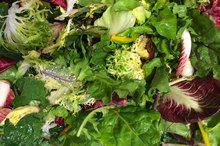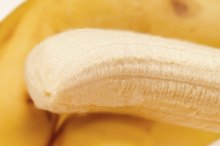What does fact checked mean?
At Healthfully, we strive to deliver objective content that is accurate and up-to-date. Our team periodically reviews articles in order to ensure content quality. The sources cited below consist of evidence from peer-reviewed journals, prominent medical organizations, academic associations, and government data.
The information contained on this site is for informational purposes only, and should not be used as a substitute for the advice of a professional health care provider. Please check with the appropriate physician regarding health questions and concerns. Although we strive to deliver accurate and up-to-date information, no guarantee to that effect is made.
Eating Too Much Potassium
Potassium has several important functions in the body; however, too much potassium in the diet can be dangerous. According to the National Kidney Foundation, levels of potassium should ideally be 3.5 to 5 mEq/L 2. Potassium levels higher than 6 mEq/L are dangerous for your health. Medical conditions such as kidney disease require a diet that limits potassium to prevent elevated levels.
Potassium
Potassium is a mineral and electrolyte considered essential, meaning it must come from the diet. Potassium plays several roles in the body, which include maintaining cell membrane function, acting as a cofactor for enzymes and maintaining normal muscle and cardiac function. Potassium may also have a role in decreasing the risk of developing certain diseases including osteoporosis, stroke, high blood pressure and kidney stones.
Sources of Potassium
Foods With Potassium Bicarbonate
Learn More
Potassium is primarily in fruits and vegetables. Foods with a high amount of potassium, or greater than 200 mg per portion, include:
- bananas
- oranges
- apricots
- avocados
- beans
- lentils
- legumes
- potatoes
Chocolate, bran products, nuts and yogurt are other foods high in potassium. Foods low in potassium include
- apples
- cherries
- pears
- peaches
- celery
- asparagus
- peppers
- okra
Portion size is very important when you need to control the potassium in your diet. For most foods, the portion size is a 1/2 cup.
- Potassium is primarily in fruits and vegetables.
- Foods low in potassium include * apples
* cherries
* pears
* peaches
* celery
* asparagus
* peppers
* okra Portion size is very important when you need to control the potassium in your diet.
Cardiac function
Potassium has a role in maintaining cardiac function; however, too much potassium can be dangerous for your heart. High levels of potassium can cause irregular heartbeat, or cardiac arrhythmia, which can lead to a heart attack and possibly death. Eating an appropriate amount of potassium in your diet can help maintain healthy potassium levels and reduce your risk for cardiac complications.
Kidney Disease
Arrhythmia & Potassium Deficiency
Learn More
Your kidneys regulate potassium levels in the body. If you have kidney disease, controlling the amount of potassium in your diet is very important, since eating too much can lead to further kidney damage 2. If you include high-potassium vegetables, leaching them before eating can reduce the amount of potassium by pulling it out of the vegetable. It is still important to limit the amount of leached high-potassium vegetables in your diet, since these will still contain potassium. A renal dietitian can help you plan your meals with the right amount of potassium based on your individual needs.
- Your kidneys regulate potassium levels in the body.
- If you have kidney disease, controlling the amount of potassium in your diet is very important, since eating too much can lead to further kidney damage 2.
Related Articles
References
- Linus Pauling Institute: Oregon State University
- National Kidney Foundation: Potassium and your CKD diet
- University of Maryland Medical Center: Potassium
- Potassium. Office of Dietary Supplements. National Institutes of Health
- Lambert H, Frassetto L, Moore JB, et al. The effect of supplementation with alkaline potassium salts on bone metabolism: a meta-analysis. Osteoporos Int. 2015;26(4):1311-8. doi:+10.1007/s00198-014-3006-9
- Chatterjee R, Slentz C, Davenport CA, et al. Effects of potassium supplements on glucose metabolism in African Americans with prediabetes: a pilot trial. Am J Clin Nutr. 2017;106(6):1431-1438. doi:10.3945/ajcn.117.161570
- Potassium. Fact Sheet for Consumers. Office of Dietary Supplements. National Institutes of Health
- Health Claim Notification for Potassium Containing Foods. US Food and Drug Administration
- Aburto NJ, Hanson S, Gutierrez H, Hooper L, Elliott P, Cappuccio FP. Effect of increased potassium intake on cardiovascular risk factors and disease: systematic review and meta-analyses. BMJ 2013;346:f1378.
- Academy of Nutrition and Dietetics. What Is Potassium?
- ConsumerLab.com. Potassium Supplements Review.
- Curhan GC, Willett WC, Rimm EB, Stampfer MJ. A prospective study of dietary calcium and other nutrients and the risk of symptomatic kidney stones. N Engl J Med 1993;328:833-8.
- Curhan GC, Willett WC, Speizer FE, Spiegelman D, Stampfer MJ. Comparison of dietary calcium with supplemental calcium and other nutrients as factors affecting the risk for kidney stones in women. Ann Intern Med 1997;126:497-504.
- D’Elia L, Barba G, Cappuccio FP, Strazzullo P. Potassium intake, stroke, and cardiovascular disease a meta-analysis of prospective studies. J Am Coll Cardiol 2011;57:1210-9.
- O’Neil C, Keast D, Fulgoni V, and Nicklas T. Food sources of energy and nutrients among adults in the US: NHANES 2003-2006. Nutrients. 2012;4:2097-120. DOI: 10.3390/nu4122097.
- Stone M, Martyn L, and Weaver C. Potassium intake, bioavailability, hypertension, and glucose control. Nutrients. 2016;8: E444. DOI: 10.3390/nu8070444.
- U.S. Food and Drug Administration. Health Claim Notification for Potassium Containing Foods.
- Weaver CM. Potassium and health. Adv Nutr 2013;4:368S-77S.
- Yong Sun, et al. Dietary potassium regulates vascular calcification and arterial stiffness. JCI Insight. 2017;2(19):e94920.
Writer Bio
Jennifer Nall is a registered dietitian specializing in weight management. She works with bariatric patients in nutrition, weight-loss and fitness counseling. Nall holds a master's degree in nutrition from Texas A&M University, with graduate research published in the "Journal of Nutrition."









